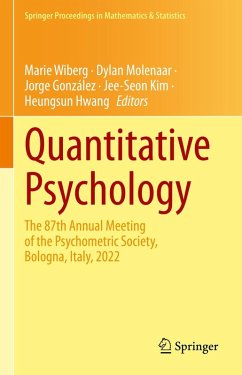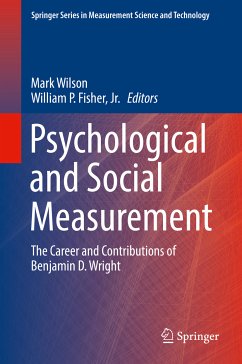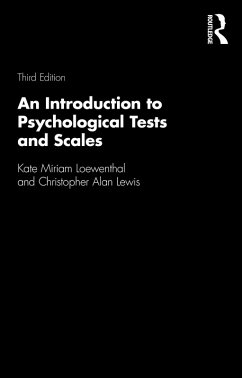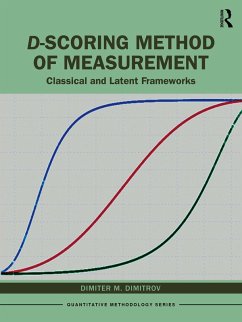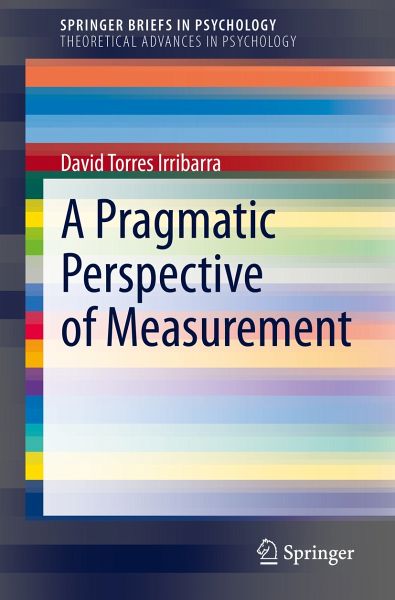
A Pragmatic Perspective of Measurement (eBook, PDF)
Versandkostenfrei!
Sofort per Download lieferbar
56,95 €
inkl. MwSt.
Weitere Ausgaben:

PAYBACK Punkte
28 °P sammeln!
This book aims to address the challenges of defining measurement in social sciences, presenting a conceptualization of the practice of measurement from the perspective of the pragmatic tradition in philosophy. The book reviews key questions regarding the scope and limits of measurement, emphasizing that if the trust that the public places on measures in the social sciences relies on their connection to the notion of measurement in the physical sciences, then the clarification of the similarities and differences between measurement in the physical and the social realms is of central importance ...
This book aims to address the challenges of defining measurement in social sciences, presenting a conceptualization of the practice of measurement from the perspective of the pragmatic tradition in philosophy.
The book reviews key questions regarding the scope and limits of measurement, emphasizing that if the trust that the public places on measures in the social sciences relies on their connection to the notion of measurement in the physical sciences, then the clarification of the similarities and differences between measurement in the physical and the social realms is of central importance to adequately contextualize their relative advantages and limitations. It goes on to present some of the most influential theories of measurement such as the "classical view" of measurement, operationalism, and the representational theory of measurement, as well as more methodological perspectives arising from the practice of researchers in the social sciences, such as the latent variableperspective, and from the physical sciences and engineering, represented by metrology. This overview illustrates that the concept of measurement, and that of quantitative methods, is currently being used across the board in ways that do not necessarily conform to traditional, classical definitions of measurement, pushing the boundaries of what constitutes our technical understanding of it. Moreover, what constitutes a technical understanding of measurement, and the theoretical commitments that it entails, must vary in different areas. In this context, disagreement on what is constitutive of measurement is bound to appear.
Pragmatism is presented as a theoretical perspective that offers the advantage of being flexible and fallibilist, encouraging us to abandon the pursuit of a timeless and perfect definition that attempts to establish decontextualized/definitive demarcation criteria for what is truly measurement.
This book will be of particular interest for psychologists and other human and social scientists, and more concretely for scholars interested in measurement and assessment in psychological and social measurement. The pragmatic perspective of measurement presents a conceptual framework for researchers to ground their assessment practices acknowledging and dealing with the challenges of social measurement.
The book reviews key questions regarding the scope and limits of measurement, emphasizing that if the trust that the public places on measures in the social sciences relies on their connection to the notion of measurement in the physical sciences, then the clarification of the similarities and differences between measurement in the physical and the social realms is of central importance to adequately contextualize their relative advantages and limitations. It goes on to present some of the most influential theories of measurement such as the "classical view" of measurement, operationalism, and the representational theory of measurement, as well as more methodological perspectives arising from the practice of researchers in the social sciences, such as the latent variableperspective, and from the physical sciences and engineering, represented by metrology. This overview illustrates that the concept of measurement, and that of quantitative methods, is currently being used across the board in ways that do not necessarily conform to traditional, classical definitions of measurement, pushing the boundaries of what constitutes our technical understanding of it. Moreover, what constitutes a technical understanding of measurement, and the theoretical commitments that it entails, must vary in different areas. In this context, disagreement on what is constitutive of measurement is bound to appear.
Pragmatism is presented as a theoretical perspective that offers the advantage of being flexible and fallibilist, encouraging us to abandon the pursuit of a timeless and perfect definition that attempts to establish decontextualized/definitive demarcation criteria for what is truly measurement.
This book will be of particular interest for psychologists and other human and social scientists, and more concretely for scholars interested in measurement and assessment in psychological and social measurement. The pragmatic perspective of measurement presents a conceptual framework for researchers to ground their assessment practices acknowledging and dealing with the challenges of social measurement.
Dieser Download kann aus rechtlichen Gründen nur mit Rechnungsadresse in A, B, BG, CY, CZ, D, DK, EW, E, FIN, F, GR, HR, H, IRL, I, LT, L, LR, M, NL, PL, P, R, S, SLO, SK ausgeliefert werden.



